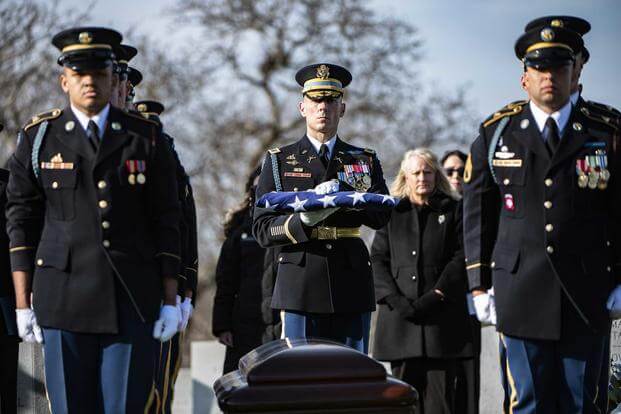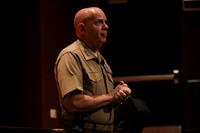Former Army captain and U.S. senator Bob Dole was laid to rest Wednesday in Arlington National Cemetery in a ceremony that reflected his honorary promotion to colonel in 2019.
The flag-draped casket of Dole, who earned the Bronze Star and two Purple Hearts as a lieutenant with the 10th Mountain Division in Italy in 1945, was carried by caisson to his final resting place, a riderless horse accompanying the procession to symbolize the officer's final look at the those he has left behind.
Dole died Dec. 5 at the age of 98.
Read Next: US Deploying 3,000 Troops in Europe to Counter Russian Threats to Ukraine
In contrast to the grand funeral held Dec. 10 in which President Joe Biden delivered the eulogy at Washington National Cathedral, Dole's graveside ceremony was relatively small, attended by his widow, former Sen. Elizabeth Dole; daughter Robin; family; and friends. Also attending were former Senate colleagues, as well as current Sens. Jerry Moran and Roger Marshall from Kansas, and Kansas Gov. Laura Kelly.
Soldiers from the 3rd Infantry Regiment and the Army Band provided the ceremonial send-off, with a traditional three-round volley and playing of "Taps."
The presence of a riderless horse, also called a caparisoned horse, is an honor reserved for Army and Marine officers of the rank of colonel and above.
Retired Navy Rear Adm. Barry Black, now serving as chaplain of the Senate, led the group in prayer, speaking of a day when friends and family would be reunited with Dole in what Black described as a "great gettin' up morning."
"Almighty God, as you once called our brother Robert into this life, so now, you have called him into life everlasting," Black said.
Dole is remembered as a three-time presidential candidate and former senator from Kansas who served in Congress, first in the House and then the Senate, from 1960 to 1996.
But to many veterans, he is remembered as a soldier who spent his senior years supporting former service members; co-chairing a commission that investigated a scandal over the egregious living conditions for wounded warriors at Walter Reed Army Medical Center in Washington, D.C.; and connecting with World War II veterans and visitors at the National World War II Memorial in D.C.
Dole enlisted in the Army in 1942 and was called up in 1944 as an officer, joining the 10th Mountain Division as a second lieutenant. On April 14, 1945, his company was attempting to take a hill in Italy when they encountered enemy fire.
Dole threw a grenade into a machine-gun nest and then dove into the hole, pulling along his platoon radioman, who had been hit. When he attempted to leave the foxhole, he took the brunt of a shell to his back, initially paralyzing him from the neck down.
He endured nine surgeries and never regained the use of his right arm -- a disability that led him later to become a champion of the Americans With Disabilities Act.
Dole became the Republican nominee for president in 1996, but after losing to President Bill Clinton, left politics altogether -- aside from being the husband of Elizabeth Dole, who served for a term representing North Carolina.
In a ceremony presided over by then-Army Chief of Staff Gen. Mark Milley, Dole was honorably promoted in 2019 to the rank of colonel -- only the third soldier ever to receive the honor. The other two were George Washington, promoted to General of the Armies, and Lt. William Clark, who was posthumously promoted to captain in recognition of his trek across what would later become the United States with Meriwether Lewis.
On Wednesday, Milley, now the chairman of the Joint Chiefs of Staff, handed the folded flag from the casket to Dole's widow.
"Senator. Elizabeth. On behalf of the president of the United States, the United States Army and a grateful nation, please accept this flag as a symbol of our appreciation of your loved one's honorable and faithful service of Lt. Dole, Capt. Dole, Sen. Dole," Milley said.
Dole was buried in Section 4, in an area known as Coast Guard Hill, home to the cemetery's Coast Guard Memorial and numerous graves of Coast Guard men and women -- the same section where Dole's Senate colleague and former Navy secretary, John Warner, was buried last year.
From Dole's gravesite, visitors have a view of the Pentagon, the Jefferson Memorial, Washington Monument and the dome of his beloved U.S. Capitol.
In his own words, in an opinion piece published in The Washington Post shortly after his death, Dole wrote of his love for the country and its symbols -- and his hope for unity as a nation moving forward.
"Many nights during my time as majority leader, I would step out on my office balcony overlooking the National Mall and be reminded of what made my journey possible. Facing me were monuments to our nation's first commander in chief, the author of our Declaration of Independence, and the president who held our union together. In the distance were the countless graves of those who gave their lives so that we could live free," Dole wrote. "Our nation has certainly faced periods of division. But at the end of the day, we have always found ways to come together. We can find that unity again."
-- Patricia Kime can be reached at Patricia.Kime@Military.com. Follow her on Twitter @patriciakime.
Related: Dole: 'Genuine Hero' Paid War's Price, Triumphed in Senate











